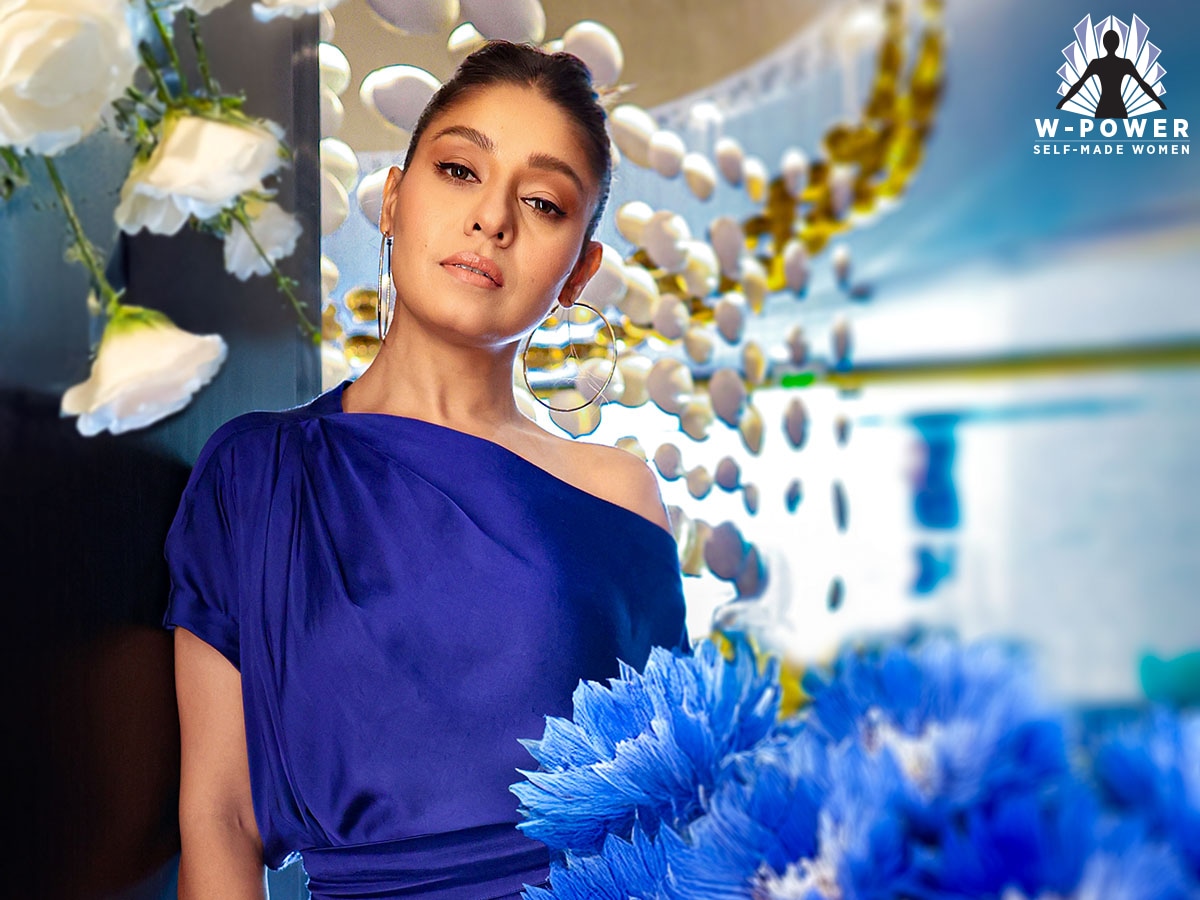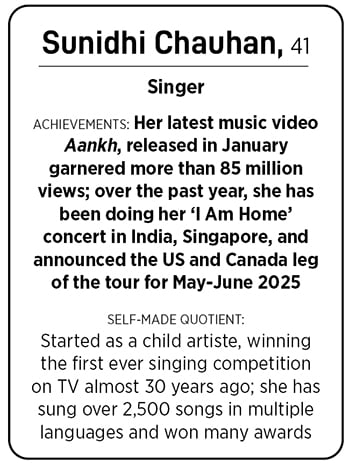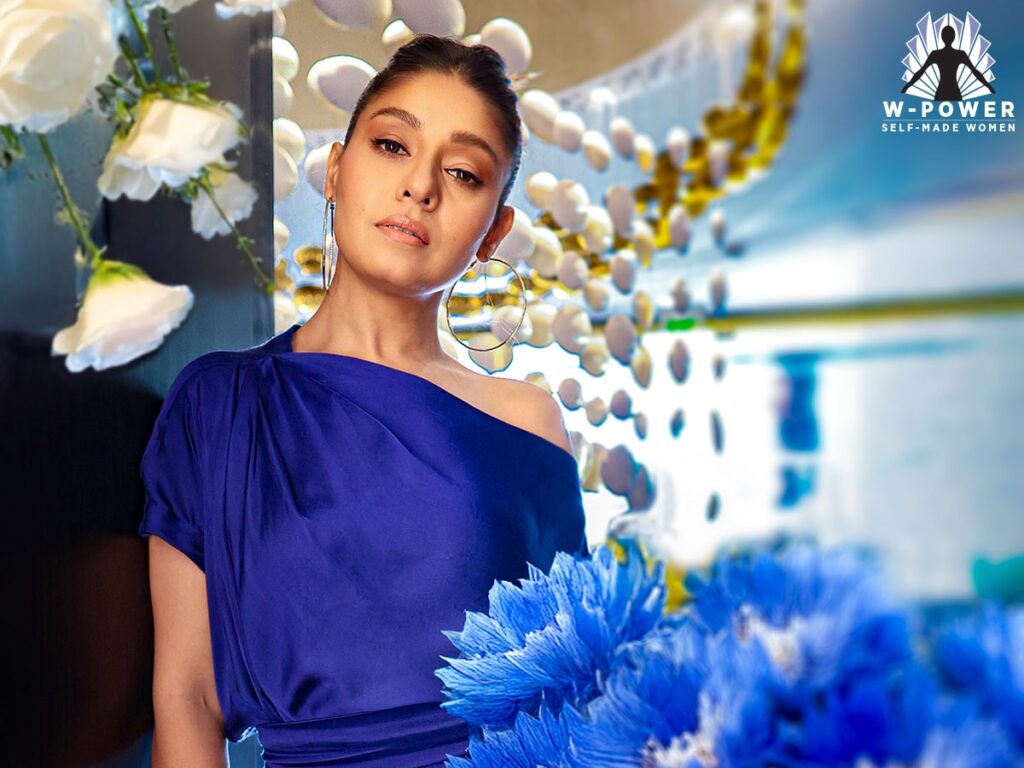 Singer Sunidhi Chauhan
Singer Sunidhi Chauhan
Imaging: Kapil Kashyap
Sunidhi Chauhan was just an 11-year-old “shaukiya” singer when the late music director, Aadesh Shrivastava, spotted her singing in a group at an event and got her to sing for Shastra, a film released in 1996. “After I sang on that professional mic, for the very first time I felt this is something I want to do for life,” says the 41-year-old.
Her breakthrough moment, though, came on the back of a desire she had nurtured since she was five or six—to meet the legendary Lata Mangeshkar. It led her to participate in Meri Awaz Suno, India’s first music competition to be telecast on Doordarshan. Chauhan, only 13 and the youngest participant, won the competition and became a household name.
But the first signs of Chauhan’s versatility came in 1999, when she sang ‘ Ruki Ruki Si Zindagi’—the song from Ram Gopal Varma’s Mast put her career on the fast track. Chauhan, who has since recorded more than 2,500 songs in over 10 languages—with some blockbuster hits like ‘Mehboob Mere’, ‘Chhaliya’, ‘Aaja Nachle’, ‘Desi Girl’, ‘Sheila ki Jawani’—has worked with some of the best music composers and music directors, including AR Rahman, Vishal-Shekhar, Salim-Suleiman and Anirudh Ravichander.
Ruki Ruki Si Zindagi’—the song from Ram Gopal Varma’s Mast put her career on the fast track. Chauhan, who has since recorded more than 2,500 songs in over 10 languages—with some blockbuster hits like ‘Mehboob Mere’, ‘Chhaliya’, ‘Aaja Nachle’, ‘Desi Girl’, ‘Sheila ki Jawani’—has worked with some of the best music composers and music directors, including AR Rahman, Vishal-Shekhar, Salim-Suleiman and Anirudh Ravichander.
But the fact that, even after spending 28 accomplished years in the industry, she hasn’t lost her hunger is evident from her recent forays—of making independent music videos that garner a million views and rolling out her own concert tours.
Click here for the full list
“There were many moments where I felt grateful, thankful, because I was doing something professionally which is turning into my only love,” she says. In the late 90s, there were a lot of successful female singers in the industry, including the likes of Asha Bhosle, Alka Yagnik, and Usha Uthup, but Chauhan feels it was a transition period where people were keen on a voice with a different texture. “It felt like a sudden moment when someone thought of something new and a room full of people accepted it and enjoyed it. I thought I was that new experiment, and what it led to is something I never expected,” says Chauhan.
What drives Chauhan is her love for music. The zeal to work on international concert tours or independent music videos—like her recent one Aankh, where she not only sang but danced too for the first time—comes from looking at the work of various artistes, and an attempt to improve herself. “I just love doing what I do, and I get inspired every day. It’s not like I want to prove anything. It’s just this energy I feel when I get inspired, and I start working.”
Also read: Bhansali Productions’ Prerna Singh: Counting on stories
Chauhan’s wide repertoire and on-stage energy is a win-win at concerts, helping her connect with audiences. “If people just wanted to listen to you, they could listen to your CD or hear your songs on the internet. If they’ve come to see you, they want to listen to your songs, but they also want to see how you interact with them and involve them,” she says.
But, while concerts and music videos add a new dimension to her portfolio, she feels this isn’t so much of a reinvention as it is a progression, and discovery through social media. “People feel I have woken up one day and thought I need to change. Nothing like that has happened. It’s like how you start something and you keep going in that direction, and you keep getting better, that’s how it has been for me,” she says.

Music composer Salim Merchant thinks Chauhan is a “complete artiste”. “She is always eager to adapt and she wants to keep learning new things. That’s what makes her Sunidhi Chauhan,” he says. Merchant’s favourite memory of hers is when the two recorded Neeyat Kharab Hai from the 2010 film Teen Patti. “The way she transitioned from the lower octave to the higher octave was flawless and so powerful. It’s something I’ll never forget.”
Despite spending nearly three decades in the music industry, Chauhan is still in pursuit of “the real thing”—an ‘ultimate song’ written by her. “I am who I am because of my music directors and their songs, but I have this secret desire of composing that one song which can reach out to as many people,” she says.
(This story appears in the 18 April, 2025 issue
of Forbes India. To visit our Archives, click here.)
 Singer Sunidhi Chauhan
Singer Sunidhi Chauhan
 Ruki Ruki Si Zindagi’—the song from Ram Gopal Varma’s Mast put her career on the fast track. Chauhan, who has since recorded more than 2,500 songs in over 10 languages—with some blockbuster hits like ‘Mehboob Mere’, ‘Chhaliya’, ‘Aaja Nachle’, ‘Desi Girl’, ‘Sheila ki Jawani’—has worked with some of the best music composers and music directors, including AR Rahman, Vishal-Shekhar, Salim-Suleiman and Anirudh Ravichander.
Ruki Ruki Si Zindagi’—the song from Ram Gopal Varma’s Mast put her career on the fast track. Chauhan, who has since recorded more than 2,500 songs in over 10 languages—with some blockbuster hits like ‘Mehboob Mere’, ‘Chhaliya’, ‘Aaja Nachle’, ‘Desi Girl’, ‘Sheila ki Jawani’—has worked with some of the best music composers and music directors, including AR Rahman, Vishal-Shekhar, Salim-Suleiman and Anirudh Ravichander.

